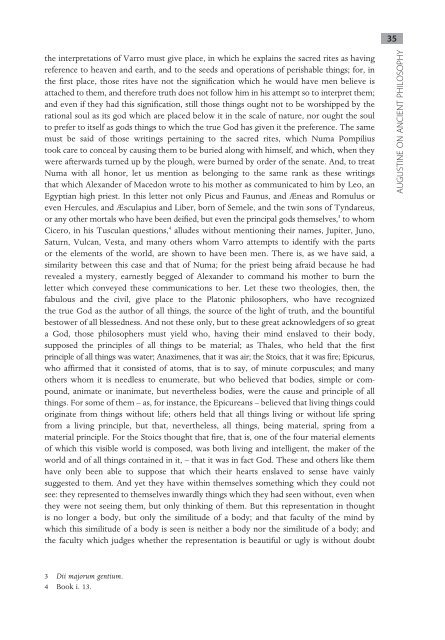Blackwell Readings in Medieval Philosophy - Fordham University ...
Blackwell Readings in Medieval Philosophy - Fordham University ...
Blackwell Readings in Medieval Philosophy - Fordham University ...
You also want an ePaper? Increase the reach of your titles
YUMPU automatically turns print PDFs into web optimized ePapers that Google loves.
MP_C01.qxd 11/17/06 5:27 PM Page 35<br />
the <strong>in</strong>terpretations of Varro must give place, <strong>in</strong> which he expla<strong>in</strong>s the sacred rites as hav<strong>in</strong>g<br />
reference to heaven and earth, and to the seeds and operations of perishable th<strong>in</strong>gs; for, <strong>in</strong><br />
the first place, those rites have not the signification which he would have men believe is<br />
attached to them, and therefore truth does not follow him <strong>in</strong> his attempt so to <strong>in</strong>terpret them;<br />
and even if they had this signification, still those th<strong>in</strong>gs ought not to be worshipped by the<br />
rational soul as its god which are placed below it <strong>in</strong> the scale of nature, nor ought the soul<br />
to prefer to itself as gods th<strong>in</strong>gs to which the true God has given it the preference. The same<br />
must be said of those writ<strong>in</strong>gs perta<strong>in</strong><strong>in</strong>g to the sacred rites, which Numa Pompilius<br />
took care to conceal by caus<strong>in</strong>g them to be buried along with himself, and which, when they<br />
were afterwards turned up by the plough, were burned by order of the senate. And, to treat<br />
Numa with all honor, let us mention as belong<strong>in</strong>g to the same rank as these writ<strong>in</strong>gs<br />
that which Alexander of Macedon wrote to his mother as communicated to him by Leo, an<br />
Egyptian high priest. In this letter not only Picus and Faunus, and Æneas and Romulus or<br />
even Hercules, and Æsculapius and Liber, born of Semele, and the tw<strong>in</strong> sons of Tyndareus,<br />
or any other mortals who have been deified, but even the pr<strong>in</strong>cipal gods themselves, 3 to whom<br />
Cicero, <strong>in</strong> his Tusculan questions, 4 alludes without mention<strong>in</strong>g their names, Jupiter, Juno,<br />
Saturn, Vulcan, Vesta, and many others whom Varro attempts to identify with the parts<br />
or the elements of the world, are shown to have been men. There is, as we have said, a<br />
similarity between this case and that of Numa; for the priest be<strong>in</strong>g afraid because he had<br />
revealed a mystery, earnestly begged of Alexander to command his mother to burn the<br />
letter which conveyed these communications to her. Let these two theologies, then, the<br />
fabulous and the civil, give place to the Platonic philosophers, who have recognized<br />
the true God as the author of all th<strong>in</strong>gs, the source of the light of truth, and the bountiful<br />
bestower of all blessedness. And not these only, but to these great acknowledgers of so great<br />
a God, those philosophers must yield who, hav<strong>in</strong>g their m<strong>in</strong>d enslaved to their body,<br />
supposed the pr<strong>in</strong>ciples of all th<strong>in</strong>gs to be material; as Thales, who held that the first<br />
pr<strong>in</strong>ciple of all th<strong>in</strong>gs was water; Anaximenes, that it was air; the Stoics, that it was fire; Epicurus,<br />
who affirmed that it consisted of atoms, that is to say, of m<strong>in</strong>ute corpuscules; and many<br />
others whom it is needless to enumerate, but who believed that bodies, simple or compound,<br />
animate or <strong>in</strong>animate, but nevertheless bodies, were the cause and pr<strong>in</strong>ciple of all<br />
th<strong>in</strong>gs. For some of them – as, for <strong>in</strong>stance, the Epicureans – believed that liv<strong>in</strong>g th<strong>in</strong>gs could<br />
orig<strong>in</strong>ate from th<strong>in</strong>gs without life; others held that all th<strong>in</strong>gs liv<strong>in</strong>g or without life spr<strong>in</strong>g<br />
from a liv<strong>in</strong>g pr<strong>in</strong>ciple, but that, nevertheless, all th<strong>in</strong>gs, be<strong>in</strong>g material, spr<strong>in</strong>g from a<br />
material pr<strong>in</strong>ciple. For the Stoics thought that fire, that is, one of the four material elements<br />
of which this visible world is composed, was both liv<strong>in</strong>g and <strong>in</strong>telligent, the maker of the<br />
world and of all th<strong>in</strong>gs conta<strong>in</strong>ed <strong>in</strong> it, – that it was <strong>in</strong> fact God. These and others like them<br />
have only been able to suppose that which their hearts enslaved to sense have va<strong>in</strong>ly<br />
suggested to them. And yet they have with<strong>in</strong> themselves someth<strong>in</strong>g which they could not<br />
see: they represented to themselves <strong>in</strong>wardly th<strong>in</strong>gs which they had seen without, even when<br />
they were not see<strong>in</strong>g them, but only th<strong>in</strong>k<strong>in</strong>g of them. But this representation <strong>in</strong> thought<br />
is no longer a body, but only the similitude of a body; and that faculty of the m<strong>in</strong>d by<br />
which this similitude of a body is seen is neither a body nor the similitude of a body; and<br />
the faculty which judges whether the representation is beautiful or ugly is without doubt<br />
3 Dii majorum gentium.<br />
4 Book i. 13.<br />
35<br />
AUGUSTINE ON ANCIENT PHILOSOPHY

















